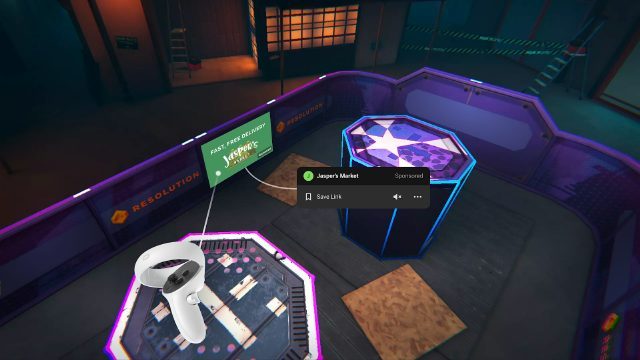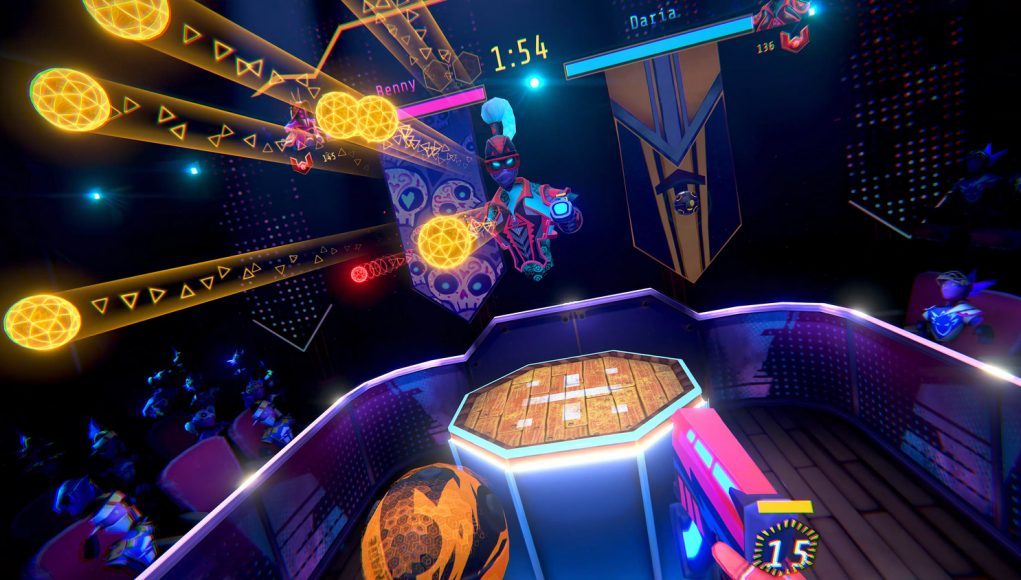Blaston, the VR dueling shooter from Resolution Games, was the subject of a controversy within in the VR community after agreeing to test a new in-game ad system from Facebook. The company says it has decided not to go forward with testing ads in Blaston, but may do so with its free VR fishing game, Bait! (2016), in the future.
Last week Oculus announced that it would begin testing a Facebook advertising system inside select VR games. VR studio Resolution Games and “a couple other developers” were said to be participating in a pilot of the system. Blaston was the only title specifically named in the announcement, and Oculus used the game to show examples of how ads might appear inside of VR games.

That made Blaston the center of discussion among members of the game’s community— and the VR community at large—which understandably would rather not see advertising in their games.
Part of the contention is that Blaston is a paid game ($10), which some feel means the game shouldn’t run ads. If anything, some said, in-game advertising should be limited to free games.
Today developer Resolution Games backtracked on its decision to test the Facebook ad system following the community backlash.
“After listening to player feedback, we realize that Blaston isn’t the best fit for this type of advertising test. Therefore, we no longer plan to implement the test,” the studio wrote on Twitter.
But Resolution Games hasn’t backed away from the idea entirely. A follow-up tweet posted three hours later said, “to make it clear, we realize that Blaston isn’t the best fit for this type of advertising test. As an alternative, we are looking to see if it is feasible to move this small, temporary test to our free game, Bait! sometime in the future.”
The debacle came at a bad time for Resolution Games as the studio just today released an update for Blaston which added new content to the game—content which the studio might have hoped would pay itself back over time from in-game ads.
– – — – –
Many games today use monetization strategies other than a single, up-front charge. This has become increasingly popular for games designed for continuous play, as the model helps pay for ongoing support like the running of multiplayer servers and development of new content. Many games with this kind of model, like Fortnite, are free-to-play up front, but offer optional in-app purchases for ongoing monetization. But there’s also plenty of examples, like PUBG, which ask for an up-front cost and also monetize further with in-game purchases.
In-game advertising, however, isn’t commonly seen in these sorts of games. If anything, the in-game advertising model is much more common in the mobile gaming sector, and often sits right next to in-game purchases that may even offer to remove the advertising for a fee.
While the decision to use in-game advertising might have been seen as perfectly normal in a mobile game, it seems that VR—even when technically running on a mobile platform like Quest—is seen by many as being distinct from mobile gaming, and there’s a clear desire from some in the community to keep it that way.
Facebook, however, is far from the first company to play with VR ads. HTC revealed a similar in-game advertising system for VR content on Viveport back in 2017, though the program never caught on. Google experimented with VR ad formats as well, though the company has since exited the VR space. And there’s plenty of examples still of companies aimed at making advertising part of virtual reality, though it is something that users have largely rejected.







